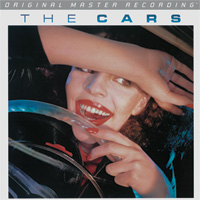 I say this with only a slight bit of embarrassment; The Cars’ debut album is my most-purchased title ever. I received it on vinyl one Christmas (way back when humans licked scum off the rocks for sustenance… 1978?), wore that out, repurchased it a year later, bought the CD at the dawn of the digital era, rebought the Rhino remaster because that initial release was horrid, and finally it has come to this — the Mobile Fidelity half-speed mastered vinyl edition. Can you imagine?
I say this with only a slight bit of embarrassment; The Cars’ debut album is my most-purchased title ever. I received it on vinyl one Christmas (way back when humans licked scum off the rocks for sustenance… 1978?), wore that out, repurchased it a year later, bought the CD at the dawn of the digital era, rebought the Rhino remaster because that initial release was horrid, and finally it has come to this — the Mobile Fidelity half-speed mastered vinyl edition. Can you imagine?
For those who like to geek out on the technical end of things, in the vinyl world a sound source is fed into the machine that lathe-cuts the groove into the metal master disc. It is this disc that subsequent vinyl imprints will be pressed from. For modern vinyl cutting, that source is a digital file and the cutting is in real time, meaning the lathe cuts at the same rate as the song is normally played. Mobile Fidelity, or Mo-Fi as they’ve branded themselves, goes back to the original analog master tape for source material and plays back the tracks at half the speed, thus being able to grab much more audio material, hence the “Half Speed Mastered” headline so famously pasted across the tops of their sleeves.
Does it make a difference? I begrudgingly have to admit that it does, and I say this because I am famously candid on the point that my love for vinyl is strictly irrational. I believe it is equal parts nostalgia, fetish and perhaps an attraction to the “bigness” of the record presentation, and that most of the time the much mentioned “warmth” and clarity of analog is the listener hearing what they want to hear, but not what really is. Yet those first palm-muted guitar plunks of “Good Times Roll” followed by the keyboard pings from Greg Hawkes definitely have something my remastered CD doesn’t, and the creeping fear that I’m becoming another arrogant audiophile has started to settle in.
Setting aside digital media entirely, the original vinyl editions of The Cars were mass-manufactured and, most often, played on really low-end turntables. My first real turntable had an 8-track deck in it, so there you go. The last tracks on either side, “Don’t Cha Stop” and “All Mixed Up” suffered terribly on that inner groove, especially the latter as there was a saxophone solo at the end, and the lack of bass clarity down at the end of a record causes some frequencies to sound thin and tweezy (“Tweezy” is a registered copyright of Dw. Dunphy Made-up Terminologies Ltd.) By using this particular cutting technology, and a grade of vinyl three times thicker than WEA’s standard weight of the time, there is enough guts in the material to take a bass signal. All this is to say that the record sounds fantastic, even on my Sony turntable bought straight off the shelf from Best Buy.
Is this an essential album? From the viewpoint of pop/rock history, absolutely. You know at least 75% of the album already even if you’ve never owned it. Is this an essential version? Only if you’re a vinyl nerd or a dedicated fan of the band. At $30+ a pop, this release will run you three times the cost of its predecessors, but if you fall into either of those two categories, you’ll truly appreciate another fine offering from Mobile Fidelity.

![Reblog this post [with Zemanta]](http://img.zemanta.com/reblog_e.png?x-id=16d6351d-7ec1-4104-b726-02c69a9aa10e)



Comments